Lost Dynasty: Michael, Magic, and how the Bulls blew a shot to become the Lakers
We coulda been a contender!
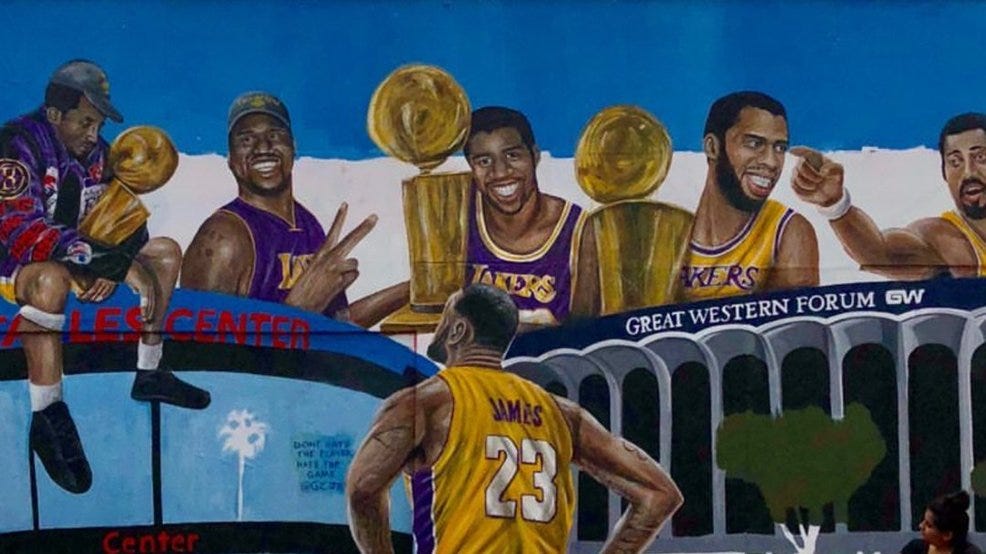
“Magic is part of the family.” — Jerry Buss, about signing one-time NBA champion Magic Johnson to his record deal after 1981
“I know I’m gonna regret this.” — What Michael Jordan recalls Jerry Reinsdorf telling him upon re-signing him to his record deal after 1996
In the summer of 2018, as the Bulls waded through the aftermath of their short-lived “Three Alphas” era, the Lakers did what they always do: they re-loaded.
With one of the game’s biggest stars.
Again.
In the summer of 2017, we traded Jimmy Butler to the Timberwolves for Zach LaVine, Kris Dunn and the #7 pick, Lauri Markkanen, leading to a 27-55 season, our worst since 2004.
The Lakers had just finished 35-47, part of the worst era in franchise history, as the team transitioned from an injured Kobe to a retired Kobe and into the unknown.
So the Lakers did what they’ve always done: they acquired one of the biggest names in the NBA, in this case LeBron James, coming off eight straight Finals appearances with two franchises and three rings.
And the Bulls did what was becoming a trend and is now a full-blown organizational epidemic: they reshuffled a bad deck and started doling out their cards.
I then did what I’ve always done: I wrote.
I called my friend Scott Lewis, CEO & Founder of the then-Barber’s Chair Network, and I wrote a piece for them on the shared history and vastly dissimilar results of the Bulls and the Lakers, two franchises with as winding a past as they come.
In the seven seasons since I published the piece, LeBron brought the Lakers a championship along with Chicagoan Anthony Davis. Meanwhile, since trading Jimmy Butler, the number of Bulls playoff wins is lower than the number of times Butler has led his team to the Finals.
This week we lost a chance at the #1 pick due in part to a coin toss last month1, just as we lost out on Magic Johnson in 1979 to a coin toss. We also lost Terry Bradshaw to a coin toss, and the only consolation is that if we drafted Bradshaw in 1970, we probably would not have landed Walter in ‘75, and if we drafted Magic in ‘79, we definitely would not have landed Michael in ‘84.
Do we have a Sweetness or an Air Jordan coming to the Bulls in the next few years? We can only hope.
Doing much better than the Bulls since 2018 is The Barber’s Chair Network, which re-branded as The Barber’s Chair Company and continues to produce fantastic sportswriting and podcasts2. When they redid their site, we had to re-published my story contributions. We just haven’t gotten around to this one.
So I asked Scott if he would mind if I published it here, and he said that was fine. I would say it was because he couldn’t stomach another sad Chicago sports piece on his website, but that’s impossible. With the exception of learning that the Pope is a Sox fan, they’re all sad Chicago sports pieces these days.
I’ve slightly edited the story, just to tighten it up in some spots. Enjoy! And as always, my condolences.
Best,
Jack
Lost Dynasty: Michael, Magic, and how the Bulls blew a shot to become the Lakers
Originally published on The Barber’s Chair Network July 22, 2018
I can’t think of a more sobering highlight of the intertwining history of the Chicago Bulls and Los Angeles Lakers than Gar Forman’s 20th anniversary of Bulls employment occurring while Lakers fans prep for LeBron James.
Yes, Gar Forman’s first day on the job with the Bulls was August 1, 1998, less than two months after the last day of the dynasty. He was hired as a scout by Tim Floyd, of all people, making Forman the longest standing link to the darkest days in the franchise.
I mention LeBron James in relation to Gar because the Lakers’ answer to their own dark days is always to acquire arguably the game’s best player. You want to talk dynasties? In 70 seasons, the Lakers have won the championship more times (16) than they’ve missed the playoffs (10)3. When they do miss the postseason, they typically come back with a vengeance by acquiring one of the league’s best players.
The first time they missed the playoffs was 1958. They went 19-53, got the first pick in the draft, and took Elgin Baylor. Their next missed playoffs was 1975. They went 30-52 and traded for Kareem Abdul-Jabbar. They missed the playoffs in 1976 and then didn’t miss again until 1994, three years after Magic Johnson retired due to HIV. Two years later they signed Shaq to the richest contract in sports history.
They essentially re-launched the franchise after 2004 by choosing Kobe over Shaquille, lost Phil Jackson, missed the playoffs in 2005, convinced Phil Jackson to return, and rode Kobe and Phil to two more rings.
And now, after missing the playoffs for five straight seasons (as many as they’d missed previously, all together), they’ve signed LeBron James.
The key difference between the Bulls as a franchise and the Lakers as a franchise is that the Bulls were a dynasty, but the Lakers are a Dynasty — big D. They’ve done this in three related ways:
An unending pursuit of superstars
An unwavering pursuit of championships
Using the former to gain the latter and the latter to gain the former
Look at this list of the Lake Show’s owner, GM and coach year by year, and then add to that an imaginary fourth column of its star players. What the Lakers have done consistently as well as if not better than any professional American sports franchise ever is use the goodwill and victory-driven capital of one era to build the next.
The Lakers don’t only go after big names when they miss the playoffs. If they did, they’d rarely sign any big names. Unlike simply the “miss playoffs, power up” moves, the Lakers’s institutional high standards have kept them in the championship mix for decades. After drafting Baylor and then Jerry West, they traded for three-time reigning MVP Wilt Chamberlain in 1968, traded for Kareem Abdul-Jabbar in 1975, pulled off fantastically lucky maneuvers that bagged the #1 pick in 1979 (Magic Johnson) and 1982 (James Worthy)4, added both Shaq and a rookie Kobe in 1996, hired Phil fresh off his one-year sabbatical and pulled off another rather fortunate trade in 2008 for Pau Gasol.
The Lakers also parlay successful players into executives. When their GM resigned in 1954, owner Ben Berger lured recently retired star George Mikan into the front office. Mikan ran the team for three years and had a horrific coaching stint in the 1958 season5, going 9-30, but that down year brought Baylor. Jerry West retired in 1974, and two years later the team moved coach Bill Sharman to GM and hired West as coach.
West replaced Sharman as GM in 1982 and ran the team until 2000, bringing in Worthy, Shaq, Kobe and Phil, meaning he had a hand in eight Lakers titles from 1985 to 2010.
Jerry Buss kept Magic Johnson with the club in basically every role possible, from player to head coach to part owner. Despite flirtations with other franchises, Kobe ended up remaining with the Lakers his entire career, from his draft trade in 1996 to his 60-point finale in 2016. Less than a year after Kobe’s retirement, the Lakers hired Magic as president of basketball operations.
For those scoring at home, since the 1948-49 season, the only seasons the Lakers have not employed in some capacity George Mikan, Jerry West, Magic Johnson or Kobe Bryant are 1959 and 1960 (Elgin’s first two years) and 1975 and 1976 (Kareem’s first two years).
That’s what I mean by Dynasty vs. dynasty. The subtext to all of the 20-year retrospectives that I and others have written about the Bulls since 2011 is the grim reality that six championships in eight years were a basketball dead end.
One Jerry, one MJ — two very different tales
To see the starting point, let’s jump back to 1981 and Magic Johnson’s historic 25 years, $25 million contract. When team owner Jerry Buss announced the deal, he said that he was already grooming Magic, then 21 years old, for a post-playing position with the club. Said Buss:
“He may even be my coach, or general manager. Or maybe he’ll run the team and I’ll just sit back and watch. Magic is a bright kid and I plan to make him my protege, teach him the business aspect of sports. I realize this is a very unusual contract because we’re talking about a kid whose college class just graduated. But what it comes down to is that Magic is part of the family.”
Buss said that about Magic after two seasons — the first was a championship, the second was a three-game first-round sweep to a team with a sub-.500 record.
Now look at what Jerry Reinsdorf said about Jordan to Jordan in July 1996 — one month after MJ brought the Bulls back to the promised land with their fourth championship in six years — as Reinsdorf signed Jordan to a one-year, $30 million deal, the richest one-year deal in sports history:
“I might live to regret this.”
That quote was Reinsdorf’s clarification to author Roland Lazenby, to which Jordan replied: “Actually, he said, ‘Somewhere down the road, I know I’m gonna regret this.’ It demeaned what was happening. It took away from the meaning of things. The gratitude seemed less because of that statement.”
Again, Jerry Buss, about a 21-year-old Magic Johnson with one championship: “Magic is part of the family.”
Jerry Reinsdorf to a 34-year-old Michael Jordan with four championships: “I might live to regret this.”
But the Bulls didn’t just miss out on becoming a Dynasty because of a feuding Jordan and Reinsdorf. For the final season of the greatest run in the modern era of professional American sports, Jackson, Jordan and Scottie Pippen were each locked in public, separate yet interconnected blood feuds with the Jerrys, all rooted in contract negotiations.
Krause drew the visceral hatred — even Phil publicly called Krause “the only dark spot” on the 1997-98 season — but Reinsdorf’s leave-your-emotions-at-the-door approach actually cut deeper on a personal level, because Jordan and Jackson held an affinity and respect for Reinsdorf that did not extend to his general manager.
To put it plainly, those guys liked Reinsdorf, which made his approach to negotiations all the more injurious.
“He’s loyal, he’s honest, he’s truthful,” Jackson told Lazenby about Reinsdorf. “But there’s something about going in and trying to get the best every time. Winning the deal. When it comes to money, to win the deal. … He has actually said those things, according to people I’ve been close to, and those things really hurt, because most everybody likes Jerry Reinsdorf.”
When we said “Last Dance,” we didn’t think it was really the last…
The second three-peat Bulls splintered along several internal fault lines, so I think it’s tricky to blame any one person for the breakup. And considering that Phil Jackson originally planned to end his Bulls coaching tenure after seven years, which would have been 1996, Reinsdorf, Krause, Jackson, Jordan and Pippen could have all gotten along famously and Phil still could have decided to retire for at least a year after the sixth title.
But based strictly on the inherent power dynamic of a professional sports team, it’s difficult to look at the past 20 years of ring-less Chicago Bulls basketball as anything other than a result of the decisions made by ownership and management in 1998.
It’s easy to imagine a world where the goodwill and excellence of the 1990s Bulls led to a subsequent run of titles. Instead, in July of 1998, just one month after MJ dragged the Bulls to ring #6, Phil was retired and Jerry Krause’s two-year pursuit of his friend Tim Floyd of Iowa State was chugging toward fruition.
That month, a reporter asked Jordan if hiring Floyd would be akin to pushing Jordan out of basketball.
“I think that’s exactly what it is,” Jordan said. “It’s very obvious that my feelings haven’t really been considered when they’ve made coaching decisions. Jerry (Reinsdorf has) always been a man of his own. He’s never really been influenced by too many people, and I wouldn’t expect him to be influenced by me. If that was the case, Phil wouldn’t ever have gone.”
And later:
“I don’t want to play for a college coach, and no, I don’t want to play for any other coach. I’ve always said that I want to play for Phil Jackson. That hasn’t changed. (Krause) made the stance on Phil Jackson, and that pretty much made the stance on me.”
The next week, the Bulls hired Floyd as something called “director of basketball operations,” with Reinsdorf stipulating that, “Should Phil not return by the end of the lockout, Tim will succeed him as head coach.” Jackson and his agent found this comical, since Krause at the start of the 1997-98 season had told Phil, “I don’t care if (the Bulls go) 82-0 this year, you’re fucking gone.”6
As for Floyd, his take on MJ was as simple as it was naive, considering Jordan’s public comments one week earlier that he would not play for Floyd, any college coach, or any coach other than Jackson.
“I know this much: I was not about to take this job if I felt it would affect, in any way, Michael Jordan’s return to the game,” Floyd explained.
Sure enough, Jackson did not return, and on January 13, 1999, with the NBA lockout ongoing, Michael Jordan announced his retirement. The dominoes fell from there in the most stunning roster changeover in NBA history:
January 15: Bulls name Floyd head coach
January 21: Bulls renounce the rights to six players including Jordan and Rodman and trade Steve Kerr to the Spurs
January 22: Bulls trade Pippen to the Rockets
January 23: Bulls trade Longley to the Suns
Incredibly and tragically, these 10 days ended up defining the franchise rather than the 10 years that came before them. The Lakers have always reloaded by either trading for or signing arguably the best player in the league (Wilt, Cap, Shaq, Bron) while also drafting franchise-changing Hall of Famer (Elgin, West, Magic, Kobe).
Yet in 20 years since ruling the sports world, the biggest veteran acquisitions the Bulls have pulled off are Ron Mercer, Jalen Rose, Ben Wallace, Carlos Boozer and Pau Gasol. There are many reasons for this failure, but perhaps the most damning is the ongoing, league-wide perception that the organization did the dynasty years dirty.
“I think the biggest question (about the Bulls) that you think about has to be loyalty,” said Illinois-native Dwyane Wade in May of 2010, as he and his future teammates LeBron James and Chris Bosh were in the process of choosing their next team, heavily weighing both the Heat and the Bulls. “I see Michael Jordan is not there, Scottie Pippen is not there. … You know, these guys are not a part (of the franchise). That is probably one of the biggest things for me, because I am a very loyal person.”
The underappreciated loyalty of Jerry Reinsdorf
The irony is that in many ways, Jerry Reinsdorf is one of the most loyal owners in sports.7 He paid Jordan the two richest single-season contracts in NBA history. He hooked up Pippen ($67.2 million over 5 years), Longley ($30 million over 5) and Kerr ($11 million over 5) with lucrative sign-and-trades in January of 1999 that vastly increased their salaries despite getting barely anything of value for them. In the post-dynasty world, he spent heavily on extensions or long-term deals on Derrick Rose ($94.8 million over 5), Luol Deng ($71m/6), Joakim Noah ($60m/5), and Kirk Hinrich ($47.5/5).
The Bulls under Reinsdorf have also been spectacularly loyal to many retired players, most notably John Paxson, who has worked with the organization in various capacities since his retirement in 1994, meaning he has been with the Bulls since 1985 when he arrived as a free agent from the Spurs. Among the other ex-Bulls who played during Reinsdorf’s ownership years and went on to work for the team: B.J. Armstrong, Randy Brown, Bill Cartwright, Horace Grant, Stacey King, Toni Kukoc, Pete Myers, Scottie Pippen, Bill Wennington, and of course Fred Hoiberg8, who played for Floyd both at Iowa State and with the Bulls.
Lastly, there is the loyalty Reinsdorf showed Krause, and the loyalty he has since shown both Gar and Pax, for whom 2018-19 will make a combined 55 consecutive seasons of Bulls employment.9
Yet when it came to the three most critical pieces of the most dominant NBA run since Russell’s Celtics, loyalty took a backseat to business. After 1996, Reinsdorf and Krause feared that the Bulls would slowly decline the way the 1980s Celtics did in the early 1990s, and thought that being proactive about turning the page would keep the team relevant.
Instead, the franchise has been doomed by 20 years that have vacillated between supreme irrelevance and mostly mid-tier playoff performances. Oh, the dynasty has had its impact, both that has been largely financial, where the United Center keeps cranking out sellouts, the team keeps churning out merchandise, and new global sponsorships come aboard led by CEOs who want to bask in the glory years.
“The Bulls are an American legend, a pop-culture icon,” said Vice President Piotr Kicinski in November 2015 when his Cinkciarz, a Polish currency exchange company, began a partnership with the Bulls that is now locked in as a seven-year deal. “It means many positive things in Poland. My generation was brought up on the Chicago Bulls playing in the ‘90s.”
So yes, the dynasty still resonates. Yet incredibly, the Bulls have managed to remain deeply loyal to the dynasty years without actually benefiting from them. We haven't been able to sign a single top tier free agent on the strength of those six rings. The team’s best player since Michael and Scottie was Derrick Rose, who was only secured in the draft when the ping pong balls came our way despite only a 1.7% chance at the #1 pick.
And like Jordan, Pippen and Jackson, Rose’s Bulls tenure ended in animus.
Gar Forman justified the Rose trade by saying it helped the team get “younger and more athletic,” the most infamous assertion by a Bulls executive since Krause’s “players and coaches alone don’t win championships — organizations do.” The link between these two comments is more than just thematic. Krause’s insistence that “organizations win championships” was driven by a hubris that turned that mantra into a self-fulfilling prophecy.
That attitude led to him pushing Phil Jackson out the door. He replaced him with Tim Floyd. Floyd’s hiring pushed out Jordan. Floyd also hired his former Iowa State assistant coach Gar Forman on Aug. 1, 1998, and Gar has been winding his way up the team’s food chain ever since, getting his wings in 2009 as general manager, Krause’s former title.
Which brings us back to the Lakers. The day Floyd hired Forman, the Bulls had six championships. If you remove the Lakers’ Minneapolis titles, all of which came before the shot clock, on Aug. 1, 1998, the Lakers had six championships too.
Less than a year later, Jerry West hired Phil Jackson as the Lakers’s new head coach, setting the stage for the next five Lakers championships. In the Minneapolis days, the Lakers were led by George Mikan, DePaul University alumnus and former star of the Chicago American Gears of the National Basketball League10. The Lakers beat the Bulls in the playoffs four times between 1968 and 1973. In 1979, the Lakers beat the Bulls in a coin toss for the right to draft Magic Johnson. And in both 2004 and 2007, Kobe Bryant took serious steps to joining the Bulls before being lured back to L.A.
But the history-altering event that stings most is the Lakers hiring Phil in 1999, an underrated seismic shift in the NBA landscape of the past two decades. The Lakers use each championship era as the bridge to the next, while the Bulls turned the greatest dynasty in American sports into a cul-de-sac.
I think of the Bulls as Charles Foster Kane, Orson Welles’s brilliant, tortured hero of “Citizen Kane.”
One era of success built their mansion.
Now they’re going to die in it.
-
-
-
Thank you to the great team at Barber’s Chair Company: Scott Lewis, Joe Lewis, Pierce Roberson and Dante Miles. Appreciate you guys!
Updated: 77 seasons, 17 championships, 12 missed playoffs
The NBA used to have a free agent compensation rule, where the team that signed a player had to give a draft pick to that player’s team. In 1976, the Jazz signed 33-year-old Lakers veteran Gail Goodrich, who played three years with the Jazz, averaged 14 points and retired. At the time, the #1 pick was determined by a coin toss between the teams with the worst record in each of the NBA’s two divisions. In 1979, that would have been between the Jazz and the Bulls; the Lakers won 47 games and reached the second round of the playoffs. But the Lakers had the Jazz pick from the Goodrich deal, won the coin toss against the Bulls and got the #1 pick in a year when that was a true jackpot, for Michigan State sophomore Magic Johnson. The Lakers then got the #1 pick in 1982 despite being defending champs based on a slightly less ridiculous trade: in 1980, they shipped backup forward Don Ford and a 1980 1st round pick to Cleveland for backup point guard Butch Lee and a 1982 1st round pick. The 1980 Lakers pick that went to Cleveland was #22; the 1982 Cavs pick that went to the Lakers was a top-2 pick, with the Lakers ONCE AGAIN winning the coin toss. (Though the 2nd and 3rd picks that year were Terry Cummings and Dominique Wilkins, so once L.A. had that Cavs pick, they were all good.)
9-30!
This quote is widely shared but rarely sourced. It is from David Halberstam’s monumental Playing For Keeps: Michael Jordan and the World He Made, page 41. In the running for my favorite sports books.
My 2023 tribute to Jerry Reinsdorf at Chicago Bulls Confidential. Thanks Mike Walton!
Hoiberg was Bulls head coach when I published this.
The Bulls kept Gar for one more season, firing him after 2020 and moving Pax to Senior Advisor, Basketball Operations.
Another player on the Gears, though not a teammate of Mikan: Bulls founder Dick Klein.



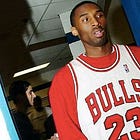
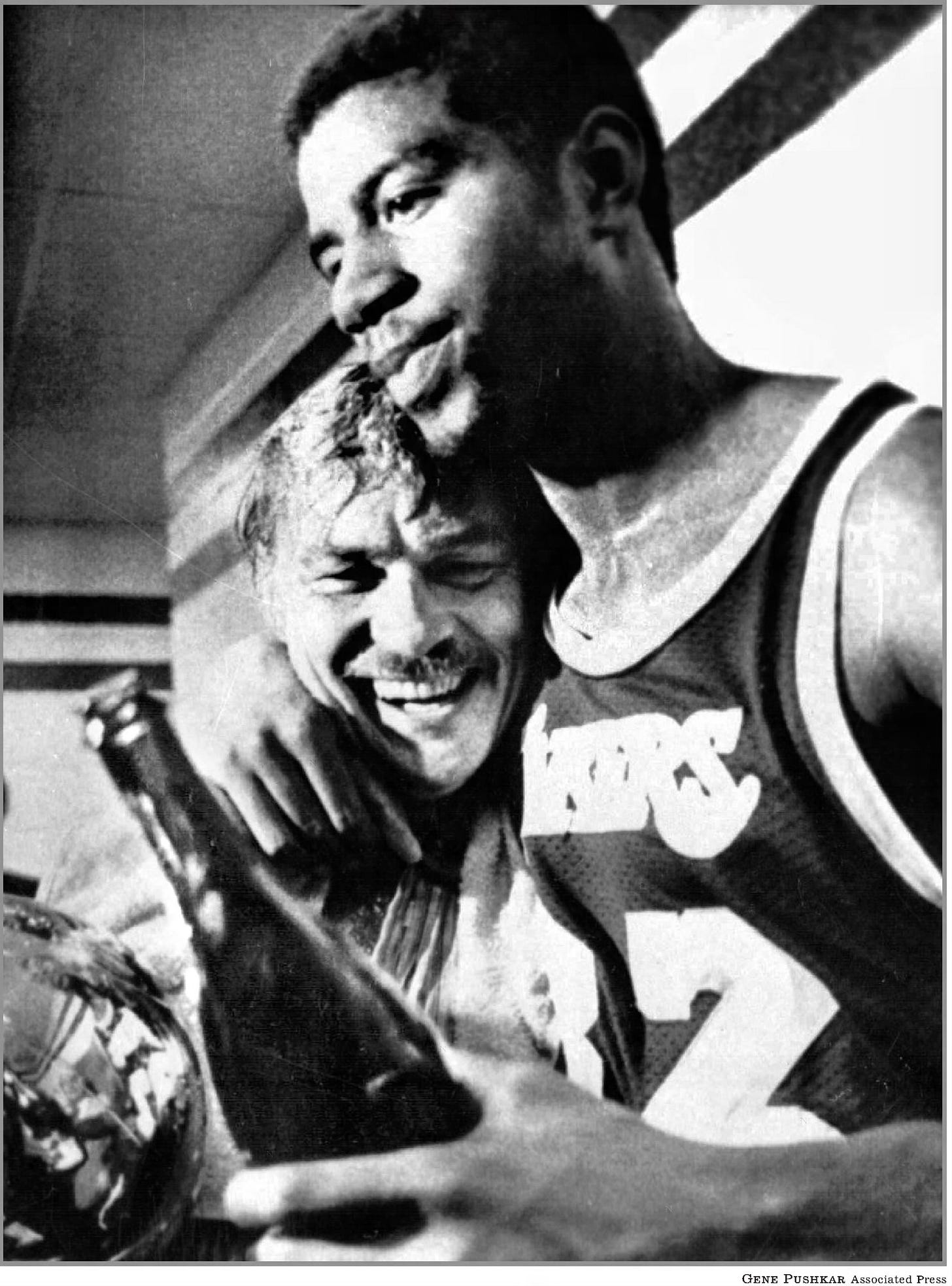
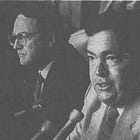

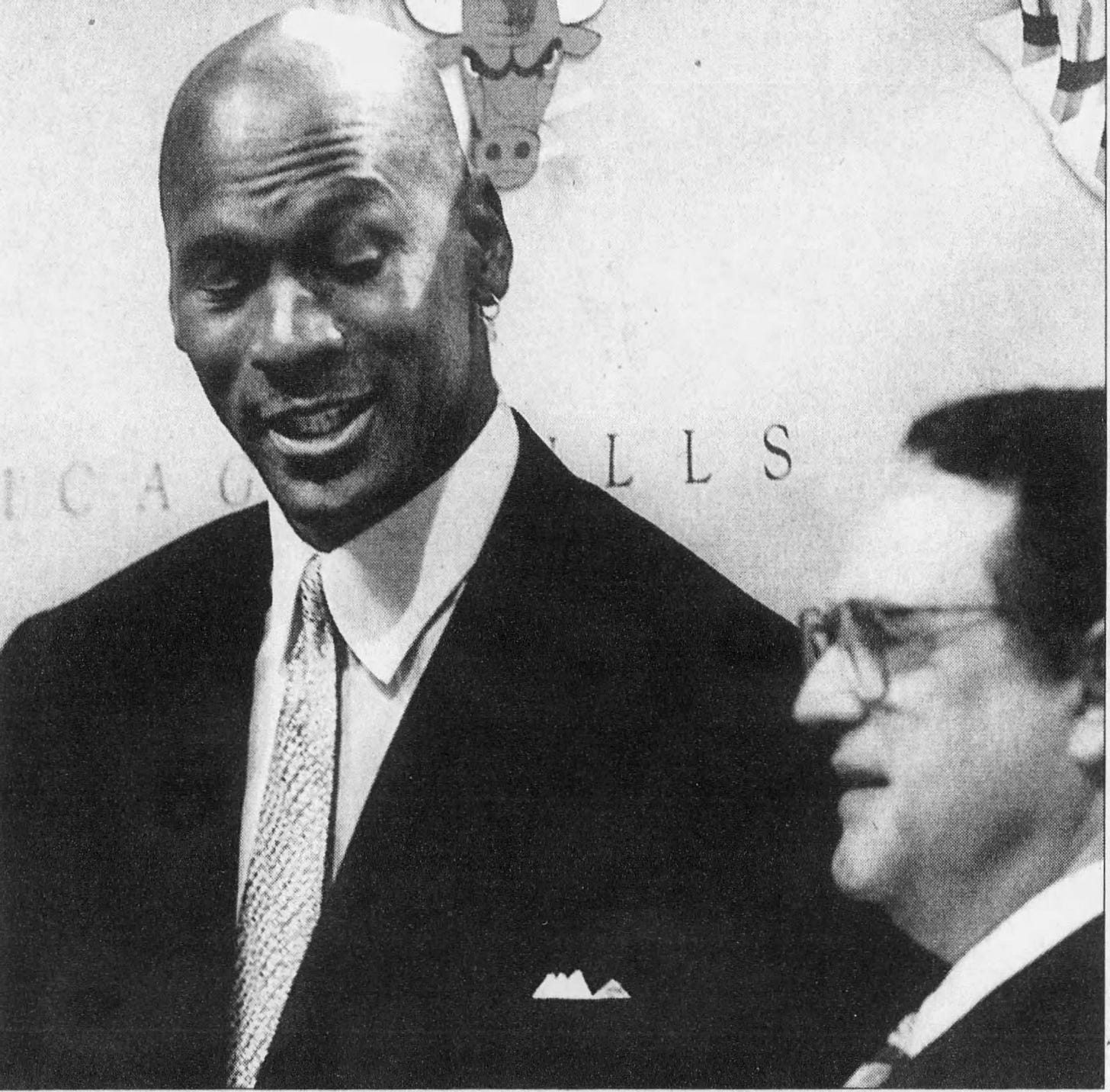
I've had this same thought recently. The Jerrys truly fumbled in 1998 and have never needed to recover. The revenue is always there because even as he doesn't want anything to do with them, they'll always be the team Michael won 6 for.
My Lord, are we the Cowboys of the NBA?
The bright spots give us hope because we've seen the mountaintop, but ultimately, we're always walking back down barefoot on sharp rocks in a raging thunderstorm.
I love our Bulls 😮💨
It's absolutely terrible that I read my condolences the way R. Kelly sung it.